AMD Zen 3 Ryzen Deep Dive Review: 5950X, 5900X, 5800X and 5600X Tested
by Dr. Ian Cutress on November 5, 2020 9:01 AM ESTCPU Tests: Legacy and Web
In order to gather data to compare with older benchmarks, we are still keeping a number of tests under our ‘legacy’ section. This includes all the former major versions of CineBench (R15, R11.5, R10) as well as x264 HD 3.0 and the first very naïve version of 3DPM v2.1. We won’t be transferring the data over from the old testing into Bench, otherwise it would be populated with 200 CPUs with only one data point, so it will fill up as we test more CPUs like the others.
The other section here is our web tests.
Web Tests: Kraken, Octane, and Speedometer
Benchmarking using web tools is always a bit difficult. Browsers change almost daily, and the way the web is used changes even quicker. While there is some scope for advanced computational based benchmarks, most users care about responsiveness, which requires a strong back-end to work quickly to provide on the front-end. The benchmarks we chose for our web tests are essentially industry standards – at least once upon a time.
It should be noted that for each test, the browser is closed and re-opened a new with a fresh cache. We use a fixed Chromium version for our tests with the update capabilities removed to ensure consistency.
Mozilla Kraken 1.1
Kraken is a 2010 benchmark from Mozilla and does a series of JavaScript tests. These tests are a little more involved than previous tests, looking at artificial intelligence, audio manipulation, image manipulation, json parsing, and cryptographic functions. The benchmark starts with an initial download of data for the audio and imaging, and then runs through 10 times giving a timed result.
We loop through the 10-run test four times (so that’s a total of 40 runs), and average the four end-results. The result is given as time to complete the test, and we’re reaching a slow asymptotic limit with regards the highest IPC processors.
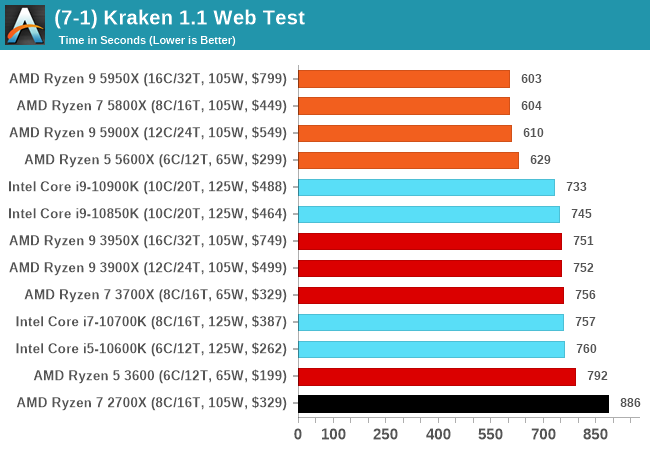
Google Octane 2.0
Our second test is also JavaScript based, but uses a lot more variation of newer JS techniques, such as object-oriented programming, kernel simulation, object creation/destruction, garbage collection, array manipulations, compiler latency and code execution.
Octane was developed after the discontinuation of other tests, with the goal of being more web-like than previous tests. It has been a popular benchmark, making it an obvious target for optimizations in the JavaScript engines. Ultimately it was retired in early 2017 due to this, although it is still widely used as a tool to determine general CPU performance in a number of web tasks.
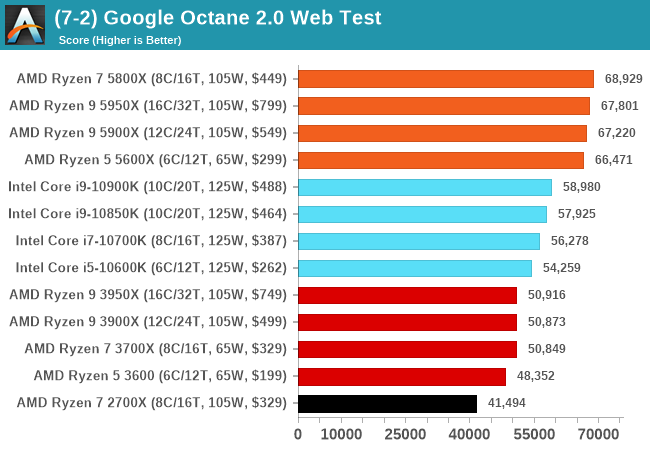
Speedometer 2: JavaScript Frameworks
Our newest web test is Speedometer 2, which is a test over a series of JavaScript frameworks to do three simple things: built a list, enable each item in the list, and remove the list. All the frameworks implement the same visual cues, but obviously apply them from different coding angles.
Our test goes through the list of frameworks, and produces a final score indicative of ‘rpm’, one of the benchmarks internal metrics.
We repeat over the benchmark for a dozen loops, taking the average of the last five.
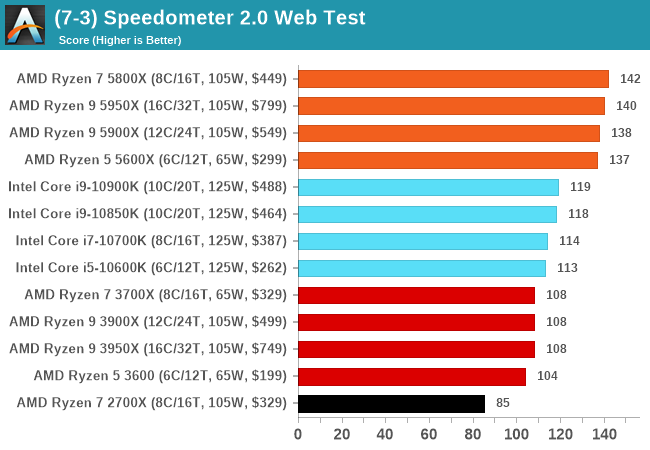
Legacy Tests
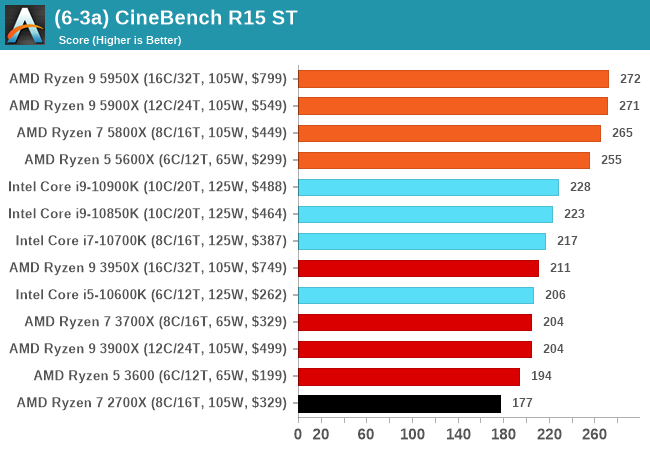
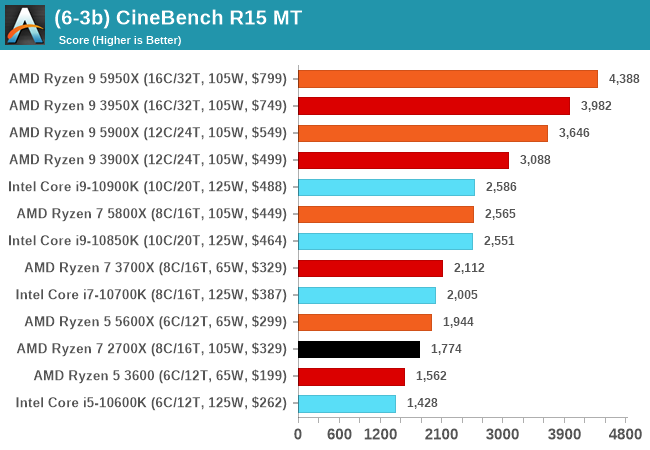
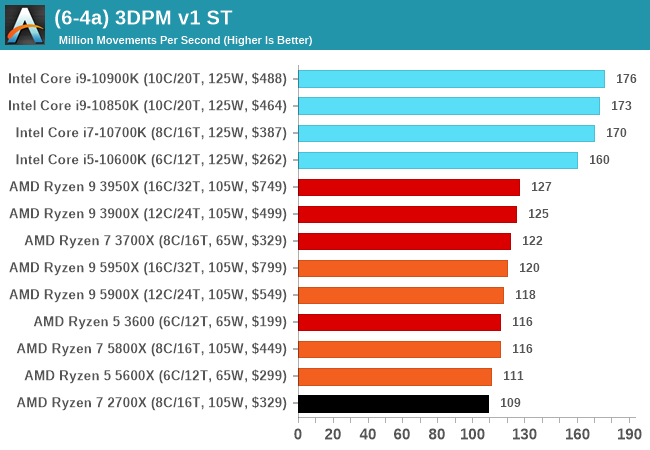
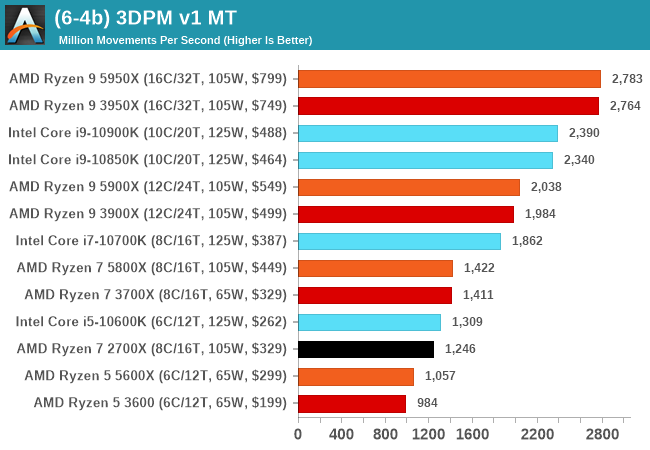


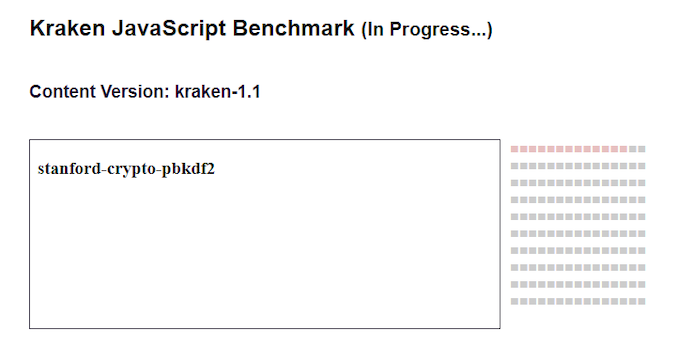
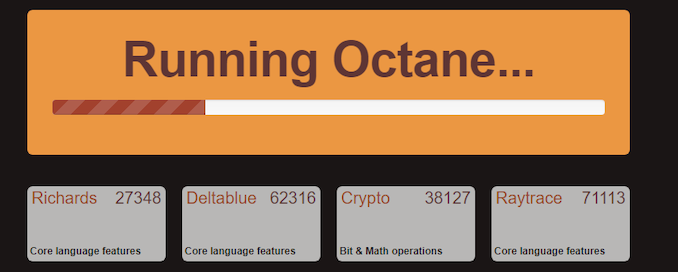
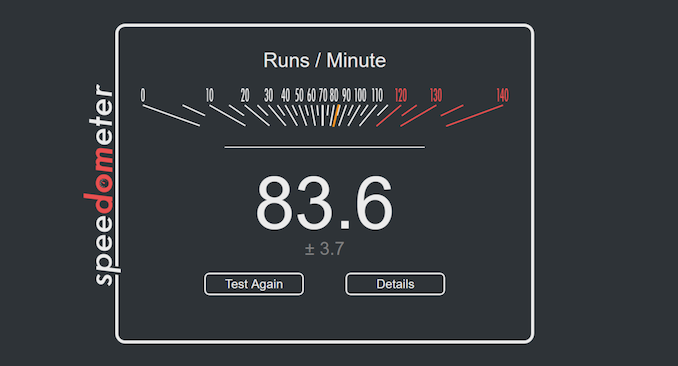








339 Comments
View All Comments
Spunjji - Sunday, November 8, 2020 - link
IO die is the same between all of them - they probably just haven't churned enough chiplets out yet. Those top-end chips probably need a high bin to reach their intended clocks and power levels, too.lmcd - Monday, November 9, 2020 - link
That seems like a mistake then -- should've released a 5890 and 5940 with lower clocks. At some point professionals are buying for IPC, thread count, and base clock speed.Qasar - Tuesday, November 10, 2020 - link
how is that a mistake ? if no need to change the IO die yet, why change anything ?Spunjji - Sunday, November 8, 2020 - link
On launch? Not really.If they're still unavailable a month or two from now, I'll be greatly disappointed.
Machinus - Thursday, November 5, 2020 - link
Looks like a great set of chips for anyone who gets one mailed to them directly from AMD.Good luck buying one in a store.
danbob999 - Thursday, November 5, 2020 - link
480p Low quality gaming benchmarks? Really? Someone really play Civ6 with those settings?What's the point? Who cares if CPU X has 454 fps while Y only does 322?
Hxx - Thursday, November 5, 2020 - link
those are unrealistic scenarios just to showcase the IPC gains over prev gen and competition. But yeah normally you would pick the resolution you are playing at and go from there. In this case at 1080p / 1440p it trades blows with Intel in most titles.silverblue - Thursday, November 5, 2020 - link
I'm not sure why the test revolves around frame rate, and not turn time. To use Gamers Nexus as a source, the 5950X completes a turn in 26.6 seconds, whereas the 10900K does it in 30.9 (29.3 OC to 5.2GHz), and the 3950X in 32.4. So, in this one test, the 10900K takes 16% longer, and the 3950X 22%.Spunjji - Sunday, November 8, 2020 - link
Yeah, I was a bit confused by not seeing turn times for Civ as that's the really big drag in late game scenarios.ExarKun333 - Thursday, November 5, 2020 - link
Zen 3 feels a lot lot Core 2 ~ 14 years ago. Wow, very impressive.